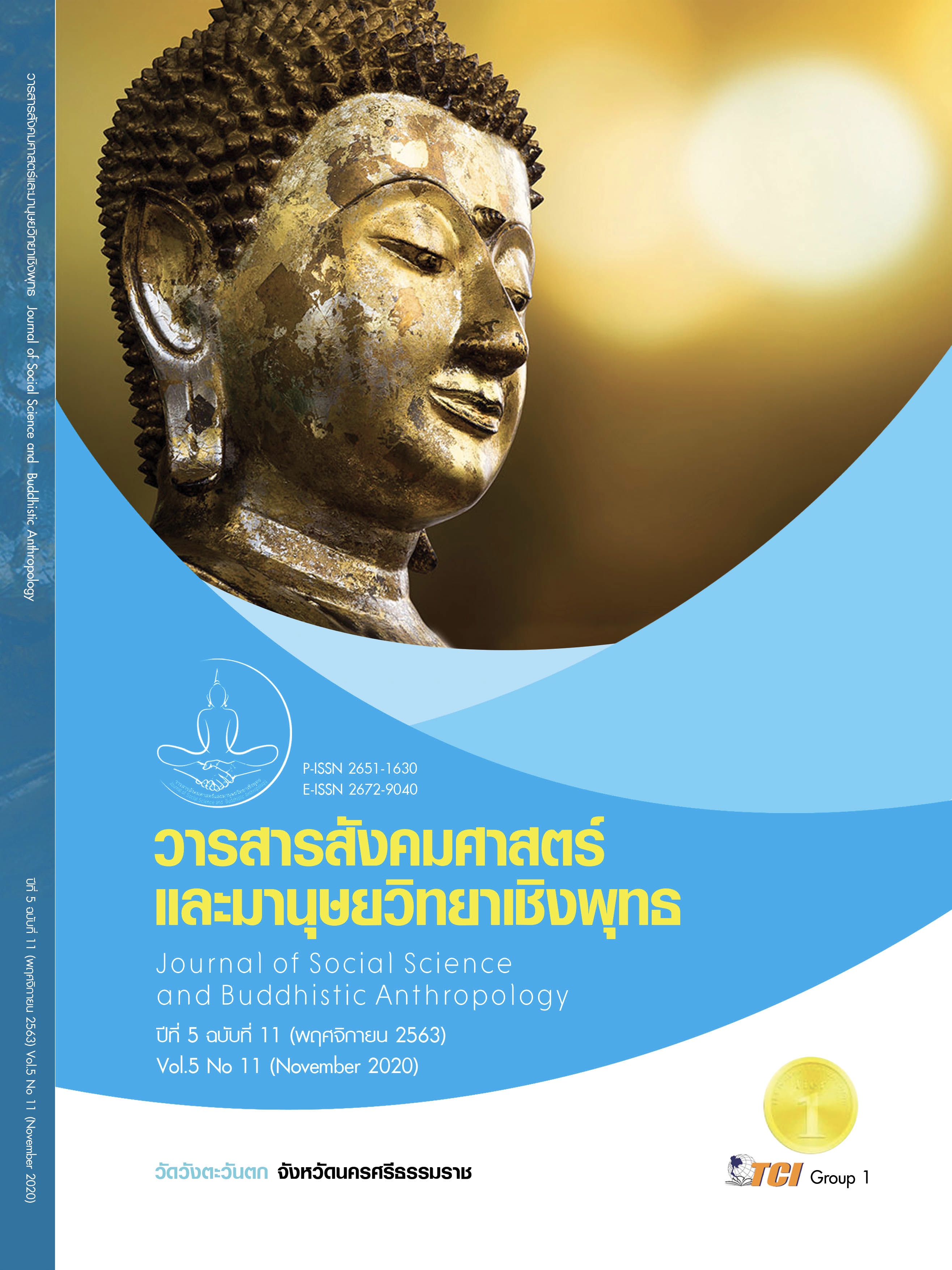BUDDHIST HOLISTIC WELL-BEING OF URBAN COMMUNITY IN 4.0 ERA: PARTICIPATING PROCESS OF COMMUNITY OF VILLAGES-TEMPLES-SCHOOLS
Keywords:
Urban Community in the 4.0 Era, Buddhist Holistic Well - Being, Participating ProcessAbstract
The objectives of this article were 1) to draw up the lesson learnt and design project activities for Buddhism holistic well-being in urban community in the 4.0 era through the participation process of community and Ban-Wat-Rongrean 2) to evaluate the project achievement of Buddhism holistic well-being in urban community in the 4.0 era through the participation process of community and Ban-Wat-Rongrean. Target groups are 128 youths in the learning center of Wat Suthiwararam, Bangkok and 34 adults in the Jitpraphatsorn Project, Ayutthaya province by purposeful sampling. This was a mixed method research. The instruments used were measurements of self-development, measurements of Buddhist happiness and interview. Data were analyzed using mean, confirmatory factor analysis, two samples test on mean, One-Way ANOVA and content analysis. The findings showed that: 1) lesson learnt found that the success external factors of youth groups are building physical space, activities to promote learning, building a network of knowledge exchange, developing social spaces, learning and activities for the generation of intelligence and creativity and the adult groups including Sappàya place, non-strict curriculum, appropriate duration, and teaching techniques of speakers 2) In the design of the activities, it was found that the youth group had 10 activities in 4 dimensions: physical, social, mental and intellectual development, 25 indicators were suitable with the empirical data (Chi-square = .04, df = 2, GFI = 1.00. , AGFI = 0.99, RMR = 0.003) and the adult group had 6 activities, four elements: physical, social, mental and intellectual wellbeing, 46 indicators were suitable with the empirical data (Chi-square = .70, df = 1, GFI = 0.99, AGFI = .97, RMR = 0.009) 3) After participating the project, youths had higher scores of self-improvement and adults higher scores of happiness.
References
กมลาศ ภูวชนาธิพงศ์ และคณะ. (2560). ค่านิยมและพฤติกรรมต้นแบบการใช้เครือข่ายสังคมออนไลน์ตามแนวพุทธจิตวิทยาบูรณาการของสามเณร. วารสารสันติศึกษาปริทรรศน์ มจร, 5(2), 39-55.
กมลาศ ภูวชนาธิพงศ์ และคณะ. (2563). ผลการใช้กิจกรรมการพัฒนาตนเพื่อเสริมสร้างสุขชีวีวิถีพุทธสำหรับเยาวชนในศูนย์การเรียนรู้พระพุทธศาสนาและการพัฒนาสังคม วัดสุทธิวราราม. วารสารสังคมศาสตร์และมานุษยวิทยาเชิงพุทธ, 5(3), 34-52.
จงลักษณ์ เผือกผิววงศ์ และคณะ. (2561). การประยุกต์ใช้สติในการดำเนินชีวิตประจำวัน:ศึกษากรณีผู้ปฏิบัติธรรมวัดคู้บอน. วารสารสันติศึกษาปริทรรศน์ มจร, 6(ฉบับพิเศษ), 156-159.
ประเวศ วะสี. (2542). ยุทธศาสตร์ชาติความเข้มแข็งทางเศรษฐกิจ สังคม และวัฒนธรรม. กรุงเทพมหานคร: หมอชาวบ้าน.
พระธรรมปิฎก (ป. อ. ปยุตฺโต). (2542). การศึกษาเพื่อสร้างบัณฑิตหรือการศึกษาเพื่อเพิ่มผลผลิต. (พิมพ์ครั้งที่ 2). กรุงเทพมหานคร: มูลนิธิพุทธธรรม.
พระพรหมคุณาภรณ์ (ป. อ. ปยุตฺโต). (2551). จะพัฒนาคนกันได้อย่างไร. กรุงเทพมหานคร: มูลนิธิพุทธธรรม.
พระพรหมคุณาภรณ์ (ป. อ. ปยุตฺโต). (2556). โยนิโสมนสิการ: วิธีคิดตามหลักพุทธธรรม. (พิมพ์ครั้งที่ 24). กรุงเทพมหานคร: ปัญญาประดิษฐาน.
พระพรหมคุณาภรณ์ (ป. อ. ปยุตฺโต). (2558). สถาบันพระสงฆ์กับสังคมปัจจุบัน. กรุงเทพมหานคร: มหาวิทยาลัยมหาจุฬาลงกรณราชวิทยาลัย.
พระพรหมคุณาภรณ์ (ป. อ. ปยุตฺโต). (2559). การเสริมสร้างคุณลักษณะ. (พิมพ์ครั้งที่ 8). กรุงเทพมหานคร: โรงพิมพ์เจริญดีมั่นคงการพิมพ์.
พระมหาบุญเลิศ อินฺทปญฺโญ. (2561). การพัฒนากิจกรรมเพื่อสร้างชีวสุขตามแนวทางการพัฒนาจิตและปัญญาแบบองค์รวม. ใน รายงานการวิจัย. มหาจุฬาลงกรณราชวิทยาลัย.
พระมหาเสงี่ยม สุวโจ (มณีวงษ์). (2561). รูปแบบการพัฒนาวัดสร้างสุขด้วยสัปปายะตามแนวพุทธจิตวิทยา. ใน ดุษฎีนิพนธ์พุทธศาสตรดุษฎีบัณฑิต สาขาพุทธจิตวิทยา. มหาวิทยาลัยมหาจุฬาลงกรณราชวิทยาลัย.
พระราชวรมุนี และคณะ. (2541). วิมุตติมรรคแปล (พิมพ์ครั้งที่ 5). กรุงเทพมหานคร: ศยาม.
พระราชวรเมธี และคณะ. (2560). การขับเคลื่อนแผนยุทธศาสตร์การขับเคลื่อนกิจการพระพุทธศาสนา 2560-2565 “การนำนโยบายสู่การปฏิบัติ”. เรียกใช้เมื่อ 22 มกราคม 2563 จาก http://www.buddhism4.com/web/index.php/9-1/5-2017-10-21-19-16-16
มหาจุฬาลงกรณราชวิทยาลัย. (2560). แผนพัฒนามหาวิทยาลัย ฉบับที่ 12. เรียกใช้เมื่อ 22 มกราคม 2563 จาก http://plandiv.mcu.ac.th/?page_id=109
สุวัฒน์ ธนกรนุวัฒน์. (2562). ผลของการฝึกสติและคิดบวกที่มีต่อสุขภาวะเชิงอัตวิสัยของบุคลากรในโรงพยาบาลชุมชน. ใน ดุษฎีนิพนธ์พุทธศาสตรดุษฎีบัณฑิต สาขาวิชาพุทธจิตวิทยา. มหาจุฬาลงกรณ์ราชวิทยาลัย.
อุบล เลี้ยววาริณ. (2555). ผลการพัฒนาโปรแกรมฝึกอบรมตามแนวพุทธ เพื่อพัฒนาสุขภาวะทางจิตของนักศึกษาระดับอุดมศึกษา. ใน รายงานวิจัย. มหาวิทยาลัยราชภัฏสวนสุนันทา.
Carmody, J. & Baer, R. (2008). Relationships between mindfulness practice and levels of mindfulness, medical and psychological symptoms and well-being in a mindfulness-based stress reduction program. Journal of Behavioral Medicine, 31 (1), 23-33.









